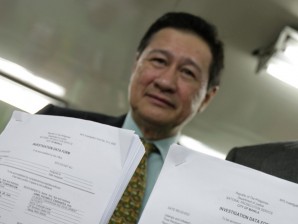MANILA, Philippines—Former Solicitor General Francisco “Frank” Chavez on Friday asked the Supreme Court to hold oral arguments on his petition questioning the membership and voting rights of the Judicial and Bar Council (JBC).
The JBC will start conducting interviews for aspirants of the Chief Justice post starting July 24. Chavez said the oral arguments could be held on July 17 or 19.
Chavez questioned the JBC’s eight-member composition and the inclusion of Sen. Francis “Chiz” Escudero and Iloilo Rep. Niel Tupas Jr. as representatives of Congress.
Chavez said Section 8, Article VIII of the 1987 Constitution clearly states that the Council should be composed of only seven members, with just one member representing Congress. He said the JBC should be stopped from holding proceedings if it continues to have eight members and that Escudero and Tupas should be prohibited from participating in the body’s meetings until the issue is settled.
In a comment filed on July 11 by Office of the Solicitor-General on behalf of Tupas and Escudero, the two lawmakers said the Supreme Court cannot stop the JBC from fulfilling its constitutional duty to screen the nominees for Chief Justice.
Why only now?
Tupas and Escudero also said Chavez has no personal and substantial interest in the resolution of the controversy, especially since he had declined nomination for Chief Justice.
The lawmakers also wondered why Chavez was questioning the JBC composition only now when he had been aware of the body having eight members since 1994.
Escudero and Tupas said that Congress is a bicameral legislature and references to it in the Constitution should pertain to both Senate and the House of Representatives.
They said that members of the 1986 Constitutional Commission had wanted a unicameral legislature but had changed its mind and forgot to alter references to a single chamber in the provision on the composition of the JBC.
“The House of Representatives without the Senate, and necessarily vice versa, is not the Congress. One without the other cannot be considered as the Congress. When the Constitution speaks of ‘a representative from Congress,’ it should mean one representative each from both Houses which comprise entire Congress,” Tupas and Escudero said.
